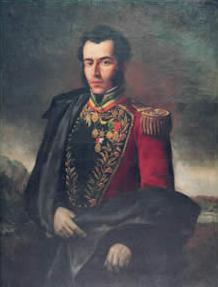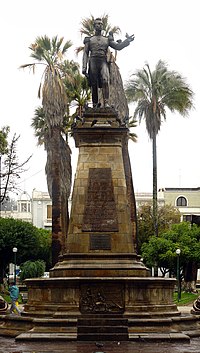Antonio José de Sucre
| Antonio José de Sucre | |
 | |
| In office 29 December 1825 – 18 April 1828 | |
| Preceded by | Simón Bolívar |
| Succeeded by | José María Pérez de Urdininea |
| In office 23 June 1823 – 17 July 1823 | |
| Preceded by | José de la Riva Agüero |
| Succeeded by | José Bernardo de Tagle |
| Born | February 3, 1795 Cumaná, Viceroyalty of New Granada (in present-dayVenezuela) |
| Died | June 4, 1830 (aged 35) Pasto, Colombia |
| Resting place | Cathedral of Quito |
| Spouse(s) | Maríana Carcelén y Larrea |
| Children | Teresa Sucre y Carcelén |
| Honorary title | Gran Mariscal de Ayacucho |
| Signature |  |
Contents[hide] |
[edit]Ancestry
The aristocratic Sucre family can trace its roots back to origins in Belgium. It arrived in Venezuela through Charles de Sucre y Pardo, a Flemish nobleman, son of Charles Adrian de Sucre, Marquess of Preux and Buenaventura Carolina Isabel Garrido y Pardo, a Spanish noblewoman. Charle de Sucre y Pardo served a soldier in Catalonia in 1698 and was later named Governor ofCartagena de Indias and Captain General of Cuba. On December 22, 1779, Charles Sucre y Pardo arrived inCumana, Venezuela having been named Governor ofNew Andalucia, present day Sucre state.
Antonio José de Sucre was born in Cumaná, then part of the Spanish Viceroyalty of Nueva Granada and the Captaincy-General of Venezuela, son of Colonel Vicente de Sucre y García de Urbaneja and wife María Manuela de Alcalá y Sánchez Ramírez de Arellano. The Sucres were a wealthy and distinguished family and his father was a military officer in the Spanish armies.
[edit]Military life
In 1814, Sucre joined the battles for South American independence from Spain. He proved himself an able military leader; in 1818, he was promoted to the rank ofcolonel and in 1821, at the age of 26, he was given the rank of brigadier general, making him one of the youngest Generals in the army. After the Battle of Boyacá, Sucre was made Bolívar's chief of staff.
In 1821, Bolívar put him in charge of the campaign to liberate Quito, and Sucre won a decisive victory at the Battle of Pichincha on May 24, 1822. Shortly after the battle, Sucre and Bolívar entered the newly-liberated Quito and Sucre was named President of the Province of Quito.
Further victories followed over the Spanish forces in Perú, notably on August 6, 1824 at the Battle of Junín. On December 9, Sucre decisively captured the bulk of the Spanish troops and command, including the Viceroy, at Ayacucho. The victory ensured the independence of Peru and Alto Perú, which Sucre and others soon established as the new country of Bolivia, thus ending all fighting for independence in Spanish South America. As a reward for his efforts, Sucre was given the highest possible honorary title of the "Grand Marshal of Ayacucho" at the age of 29.
After the victory at Ayacucho, Bolívar would write his Resumen Sucinto de la Vida del General Sucre, or "Short Review of the Life of General Sucre" a short biography full of flattering comments about his lieutenant. In a letter telling Sucre of the biography he had written, Bolívar said:
| “ | Believe me, General, nobody loves your glory as much as I do. Never has a Chief paid more glorious tribute to a lieutenant. At the moment it is being printed, a telling of your life done by myself; being faithful to my conscience I give you all that you deserve. I say this so that you can see that I am fair: I disapprove much that I do not think is right, but at the same time I admire that which is sublime. | ” |
[edit]Post-independence period
Sucre was elected president of Bolivia in 1826, but he became dissatisfied with local political developments. In 1828, when a strong movement arose against Bolívar, his followers and the Bolivian constitution, Sucre resigned. He was never really happy in as a politician and intended to retire from politics. He moved to Quito, the home city of his wife, Mariana de Carcelén y Larrea, Marquess of Solanda (July 27, 1805 - December 15, 1861), daughter of Felipe de Carcelén y Sánchez de Orellana and Teresa de Larrea y Jijón. He had an illegitimate son by Manuela de la Concepción de Roxas y Iñíguez (b. December 13, 1809) named Pedro César de Sucre y Roxas on June 7, 1828. He had a daughter by his wife, who was born in Quito on June 30, 1829 but died there on November 15, 1831.
In late 1828, urged by Bolívar, the Congress of Gran Colombia named Sucre President of Congress. They also intended to name him Bolívar's successor, but this came to nothing because Sucre likely would have it turned down. Sucre was named to a commission, headed by José Antonio Páez, that traveled to Venezuela in 1829 to quell political separatism among local authorities. The difficulty of this task added to Sucre's continuing dissatisfaction with Gran Colombia's political environment.
[edit]Death and legacy
In early 1830, Sucre heard the news about Bolívar's resignation and intention to leave the country, so he decided to return Quito in order to resume his private life. However, he was fatally ambushed near Pasto, at the Sierra de Berruecos in southern Colombia on June 4, 1830.
The details of the murder were unclear and theories about it abound. One of the older and better documented theories says that José María Obando masterminded the assassination, and one of the alleged assassins named in this theory was later executed for his apparent role. Later theories implicated different (or additional) individuals, such as Juan José Flores,Agustín Gamarra and Francisco de Paula Santander.
Some have argued that Sucre was assassinated so as to leave no clear successor to Bolívar. Sucre represented, according to historian Tomas Polanco Alcantara, "the indispensable complement to Simón Bolívar". When news of Sucre's death came to Bolívar, he said, "Se ha derramado, Dios excelso, la sangre del inocente Abel..." ("The blood of the innocent Abel has been spilled, God almighty..."). Bolivar later wrote (Gaceta de Colombia, July 4, 1830):
| “ | If he had breathed his spirit upon the theater of victory, with his last breath he would have given thanks to heaven for having given him a glorious death; but cowardly murdered in a dark mountain, he leaves his fatherland the duty of persecuting this crime and of adopting measures that will curb new scandals and the repetition of scenes as lamentable and painful as this. | ” |
The department of Sucre in Colombia and the city of Sucre in Bolivia are named after him. The former currency of Ecuador was the sucre. In 1909 the State of Venezuela in which he was born, Cumaná, was renamed Sucre. A large neighborhood in the city of Caracas is named Sucre, and there are several Venezuelan municipalities named Antonio José de Sucre Municipality or Sucre Municipality. ABolivarian Mission, Mission Sucre, is named for him. The Macagua Dam in Ciudad Guayana was named after him as well.
Some of his descendants in Venezuela, Ecuador and U.S.A have followed in his military and political footsteps.
Antonio José de Sucre is buried in the Cathedral of Quito, Ecuador, as he had said, "I want my bones to be forever in Quito".
[edit]Further reading
- Sherwell, Guillermo A. (1924). Antonio José de Sucre (Gran Mariscal de Ayacucho): Hero and Martyr of American Independence. Washington, D.C.: Byron S. Adams.
[edit]External links
- (Spanish) Historic document: Memoria a la asamblea del Alto Perú en el día de su instalación.
| Preceded by Simón Bolívar | President of Bolivia December 29, 1825 – April 18, 1828 | Succeeded by José María Pérez de Urdininea |
| Preceded by José de la Riva Agüero | President of Peru June 23, 1823 – July 17, 1823 | Succeeded by José Bernardo de Tagle |
| |||
| |||


No hay comentarios :
Publicar un comentario